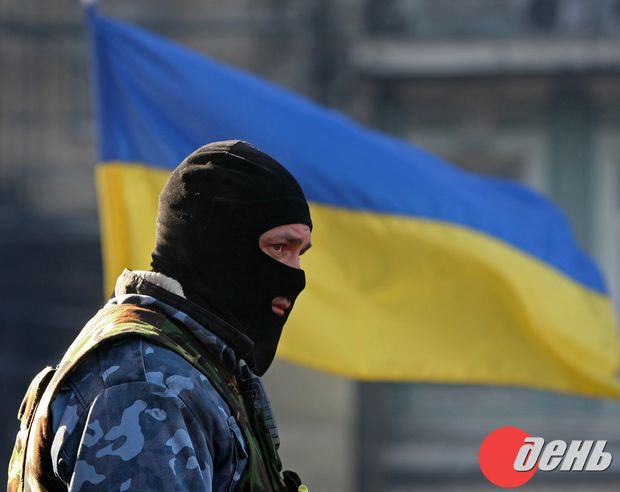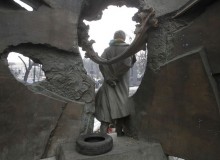Things are moving. Over the weekend, the authorities and the opposition reached a compromise on one issue at least, allowing the amnesty law to come into effect on February 16. The opposition initiated evacuation of the Kyiv City State Administration (KCSA) building and a number of regional administrations buildings, and partially restored traffic in Hrushevsky Street. In return, the authorities pledged to close all court cases against previously detained protesters within a month.
The deal involved international mediation. In particular, the act on the transfer of Kyiv city hall was signed by its former revolutionary governor Ruslan Andriiko and Ambassador of the Swiss Confederation Christian Schoenenberger. The newly appointed head of the KCSA Volodymyr Makeienko did not sign it, but stressed that he would not press any claims against the protesters.
Meanwhile, many Euromaidan activists were uneasy with the deal, with some of them accusing opposition politicians of “selling out the protest,” “betrayal” and “refusal to explain anything.” Others, on the contrary, saw the latest moves by the opposition to be a success. “The main thing is to get all our imprisoned brethren released,” The Day heard from self-defense fighters. “In any case, nobody will evacuate Maidan, while the KCSA building can be recaptured by us at short notice.”
However, both pessimists and optimists looked very tired. After months of protest, feelings of uncertainty, extreme exhaustion, and lack of concrete results from the talks between the government and the opposition have only intensified. “Viktor Yanukovych does not want to make concessions, while Oleh Tiahnybok, Vitalii Klitschko, and Arsenii Yatseniuk are unable to force him to,” one of Right Sector activists, who asked not to be identified, told The Day. “The Euromaidan is the only factor that prevents them from clinching a behind-the-scenes deal already. We must keep up our pressure on them.”
February 18 is billed as yet another decisive day. Once again, politicians on both sides of the divide see the parliament as the platform to find a way out of the crisis. Protesters, too, hope that the Verkhovna Rada will work efficiently. Instead of going to revolutionary barricades, they call on opposition leaders to turn into negotiators equal to those on the government side.

Photo by Mykola TYMCHENKO, The Day
“The opposition will receive from us all the moral support it needs,” the protesters maintain. “We have enough energy to power them all.”
Meanwhile, Ukrainian politicians go to consult with their foreign counterparts before making important decisions, and these trips have already become a “tradition.” The opposition accuses Yanukovych of conducting covert “consultations” with Russian president Vladimir Putin, while the authorities respond with allegations of a “political conspiracy” involving opposition leadership, the US and EU.
This time, it was leader of Batkivshchyna Arsenii Yatseniuk and head of the UDAR Vitalii Klitschko who went to hold talks abroad. German chancellor Angela Merkel invited them, officially to seek ways to resolve the political crisis in Ukraine, but unofficially, “the opposition is interested in more active involvement of the EU and greater pressure on the government,” political analyst Volodymyr Lupatsii told The Day.
“I do not think the opposition’s actions will depend on today’s meeting,” UDAR MP Pavlo Rozenko disagreed in his comment for The Day. “We have a plan of our own which we are implementing and will continue to do so. The EU is interested in peaceful resolution in Ukraine, so that the union bordered a zone of stability, rather than a warzone or conflict zone.”
Actually, The Day’s sources in Batkivshchyna said that the political and economic stabilization of the country would dominate the talks in Germany. The main reason for the diplomatic activity of the EU is the threat of Ukraine’s default, likely to occur in a week or two.

Photo by Mykola TYMCHENKO, The Day
Such statements, among others, have repeatedly been coming from Russian officials. They warned that Yanukovych would not get another installment of Russian credit line while Ukraine had no Cabinet. International players have entered the Ukrainian game.
The president’s inner circle has its own plans for the parliament’s efficient work. The new prime minister should consolidate representatives of various political and financial groups in the Party of Regions and banish all talk of a split in the faction, experts maintain. “The Verkhovna Rada should work, MP Mykhailo Chechetov stated. “We expect that, executing his constitutional powers, the president will submit the candidacy of prime minister to the Verkhovna Rada this week. We will not find enough votes for an opposition candidate, so prime minister will come from the Party of Regions.”
Chechetov described his vision of the new head of government as “professional, good organizer, strong top manager.” When asked who he meant, the Regionnaire avoided any definite answers. “The president knows better, and we in the Party of Regions will support his decision,” the MP said.
Meanwhile, the opposition maintains that they will definitely not support any candidate coming from the current government. “Trying to push a prime ministerial candidate from the inner circle through the parliament without consulting the factions can contribute to overcoming the economic crisis, but not the political one. On the contrary, it will only exacerbate it,” Rozenko said. “It is desirable that the next prime minister get at least 400 votes. It is possible. The political solution must be sought only in dialog with the president.”
The opposition members are growing more reluctant to discuss the likelihood of a quick return to the Constitution of 2004. They have failed to enlist the help of the Party of Regions MPs. “The chance has been lost,” the representatives of the parliamentary minority state bluntly.
Tactics of the authorities is clear. They still think that the Euromaidan will dissolve on its own, and use delaying tactics to bring that result. The opposition has actually quitted active political games and places its hopes solely on support of international mediators and the results of behind-the-scenes agreements with the government. No side is still seeing the Euromaidan as a factor in this political card game.








